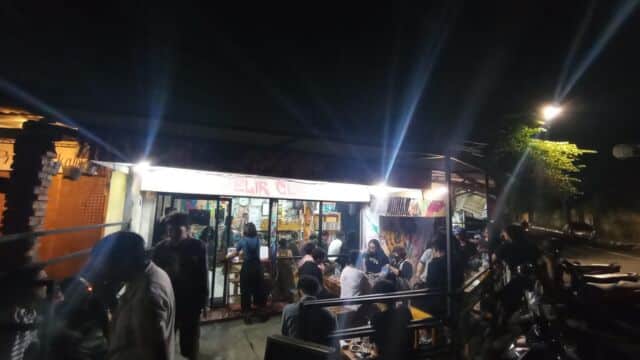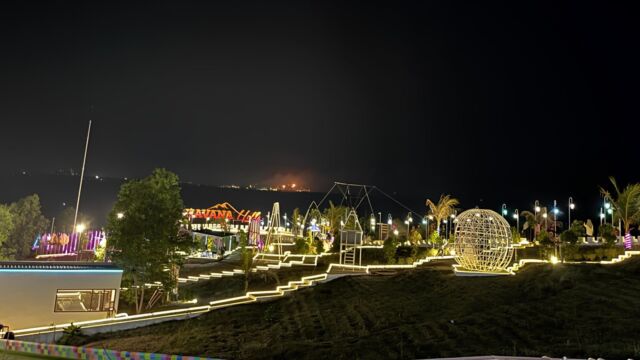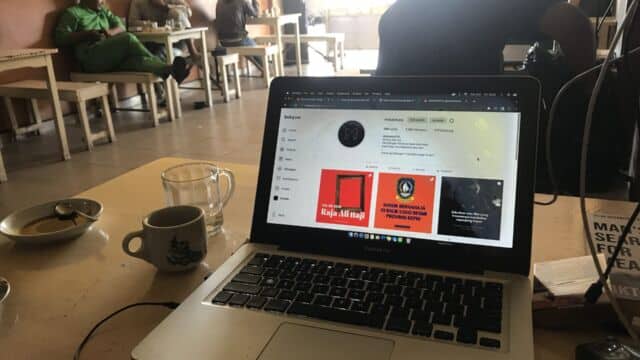Notes From a Javanese Village
Bantul, Yogyakarta. Photo: Fahmi Sudira/Unsplash.
A village in Bantul, Special Region of Yogyakarta | 2,500 words | Translated by Sarah Leys
‘Taakkkk taaakkkk taaak’.
A sound like a glass bottle popping and combusting in a fire, coming from the back yard of the neighbours’ place.
That afternoon the sun was fierce, and there was no breeze. I was trying to sleep on a long wooden bench in the front room, squinting my eyes tightly, disturbed by sunbeams slanting in.
Burning trash in the early afternoon isn’t unusual in rural areas. The thing is, there aren’t trucks here that routinely take all piles of waste off to Integrated Garbage Disposal Stations like when you live in urban housing complexes. Here, we ourselves have responsibility for the trash we produce.
But my hunch was wrong. Rather than rubbish being set alight, it turned out the sound was coming from the asbestos roof of our neighbours’ kitchen, which had caught fire.
Black smoke billowed upwards. The kitchen wall, made only of bamboo, was almost gone. Vertical wooden posts standing in the corners of the kitchen were charred black, as was the roof itself.
Fortunately, the neighbours’ kitchen is in an outbuilding, and it’s also right beside a pond full of giant gourami. The fire hadn’t yet spread to their brick-walled main house. Hurriedly, me and the other neighbours, shoulder to shoulder, set about extinguishing the flames. People took water from the pond using buckets. People connected a hose up to a tap outside. Within half an hour the fire was out except for some embers in the wooden posts, which some old men were endeavouring to smother.
‘You haven’t got work?’ It was a young woman, wearing a pink T-shirt, standing to my left.
The two of us, from a safe distance, stood watching the old men fight the lingering embers inside the kitchen.
I looked over at her, then answered with friendliness: ‘already, Mbak, earlier this morning’.
‘Huh – how come you’re already home?’ she asked, her brow furrowing. I guess because it was only early afternoon, whereas office-work tends to finish at about 4pm.
‘Yeah, cos I work from home. Online’.
‘Ohhh. Which platform?’
I was a little flummoxed as I searched for a concise way to clarify things for her. That I am currently WFH (Working from Home) for a media organisation while also freelancing as a content writer. But she had taken the term ‘online’ to mean online selling – people hawking their own wares on Facebook, WhatsApp, Instagram and other sites.
‘No, like, um, like editing, Mbak’, I stammered. ‘Copywriting news articles’. I couldn’t seem to find a better, more-easily understood choice of words.
‘Oh…’ Her brow wrinkled, her lips pursed.
Incidents like this have become par-for-the-course for me whilst living in this place.
I’m a new inhabitant of this village, located in the southern part of Bantul, on the outskirts of Yogyakarta. It’s been exactly a year since I bought a house here.
The property where my partner and I live is at the end of a no-through road. To the north and west it borders neighbours’ land that is full of tamarind trees, coconut trees, mahogany, teak and banana trees, and bamboo groves. Further out, rice-fields stretch far and wide.
Perhaps some people assume I’m living the dream: living comfortably in a village, but on a city salary. Inhaling fresh air, still not very polluted here, ‘healing’ every day by walking in the rice-fields or along village roads flanked by shady trees, finding ‘hidden gems’ in the village’s neglected corners, and interacting with friendly locals – all while working from home and bringing in the rupiah.
Honestly, though, life in the countryside isn’t as simple as that. After a year here, I’ve become aware that images of village life shown on social media are very reductive. Village life is actually pretty complicated, not so different to living in the city – actually, it might be more complicated than living in the city.
It’s true that living costs in the countryside are much lower. I can save money because, instead of needing to buy drinking water, there’s an artesian well in my yard, put there by the previous resident: he dug four or five metres into the ground to find groundwater, then installed a pump to bring it to the surface. Not a thing I’d be able to do if I lived in an urban-style housing complex. I can also buy food at low prices by shopping at local markets instead of a supermarket. And when doing any sort of repairs, I often get free assistance from neighbours.
But the social cost of living in the countryside is quite high – a consequence of living in the middle of a population that is still very communal.
For example, as new arrivals in this place, my partner and I couldn’t just move in, introduce ourselves and report to local administrative officials – what you’d do if moving into a housing complex. Here, we had to throw a big celebratory feast and invite everyone in the village.
For such an event, usually all the women will gather in the house of the organiser, to help cook and simultaneously get to know the female host. Houses in rural areas typically have large kitchens, in a separate building to the house, in which 20-30 people can cook at the same time, and the organiser’s kitchen will be used to prepare for the feast over several days.
Unconsciously, I thought, I still sometimes ‘exoticize’ the village. I see myself as removed from it, as an outsider, even though I live in it, and have become a part of its community.
Then at the feast the hosts will introduce themselves and ask for everybody’s blessing to join the community. That’s followed by a get-to-know-you session: the heads of households who attend will be asked to eat the food prepared by the host and this is an opportunity to engage in small-talk, so the hosts can say more about themselves. Discussions about work, about how many siblings one has, and about the complications of moving house will flow while people enjoy the meal. Everyone tends to be given food to take home with them.
But the house we had moved into couldn’t accommodate all this because it has a modern kitchen, integrated with the rest of the house and only big enough to fit two people cooking at a time. Added to that we still had to work, another reason we couldn’t accompany all the women who were offering themselves to help us. So my partner and I ultimately prepared for the feast alone, plus my mother. We cooked for 15 people and ordered 70 food packets from a friend who has a catering business.
There are lots of similar celebratory events in this village of mine. To commemorate births, deaths, birthdays, people finding work, the construction of a house, buying a vehicle or livestock, and others besides. These events will pretty thoroughly empty both your pockets and your personal energy levels if you join all of them. Because the social cost is paid not only in money, but also in effort and time: the expectation is that you will help your neighbours if they want to put on these affairs. For other villagers, most of whom are farmers, that’s not an issue, but for us with our different working hours it’s a difficult problem.
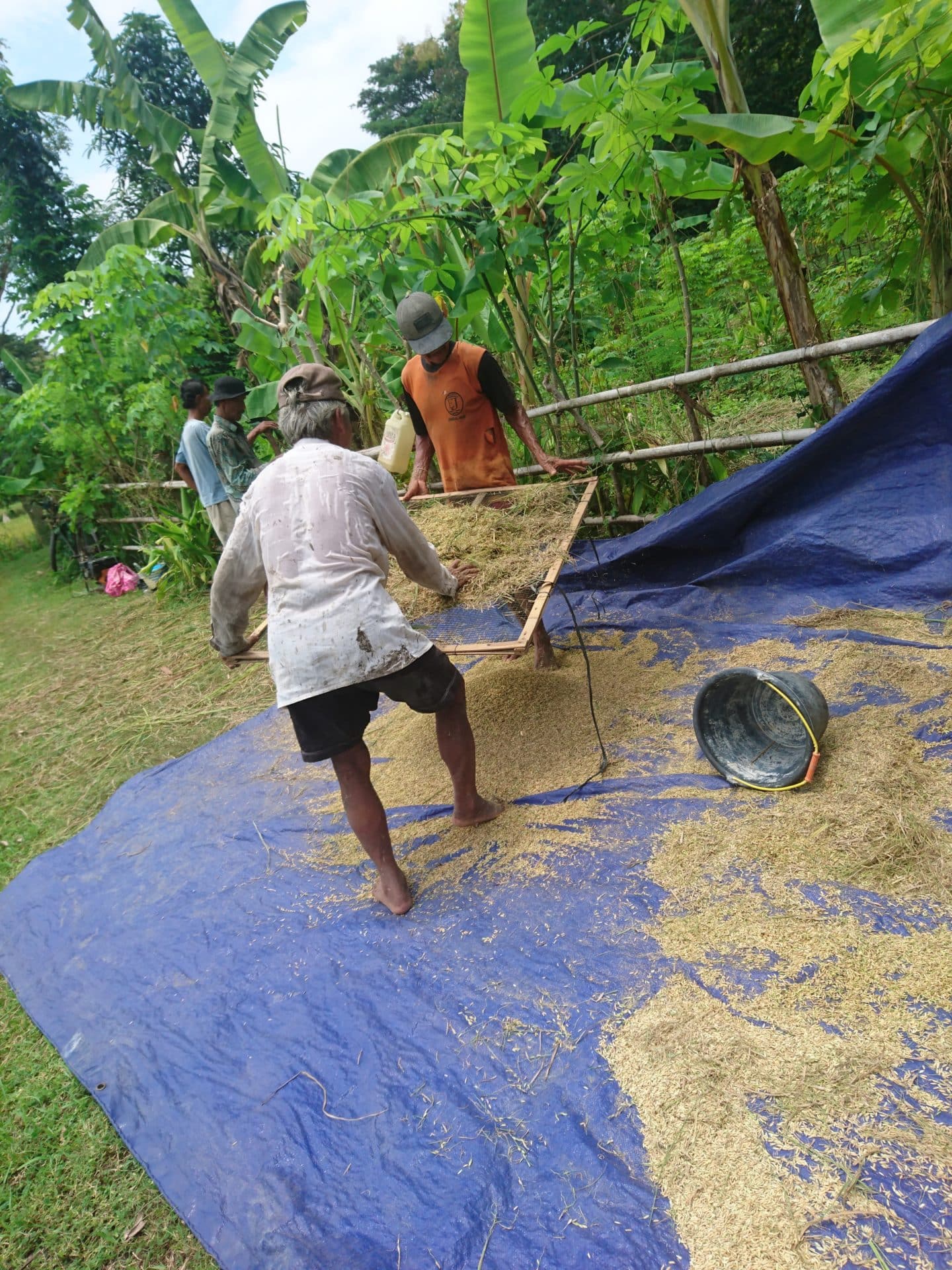
If you’re working in the rice-fields, it’s possible that all your tasks will be complete before 9am WIB (Western Indonesian Time) – after that, you can freely tend to other things. But for me it’s different – especially at times when I’ve taken on more freelance gigs in addition to my regular job. One day I can wake late and be unhurried because I have an afternoon shift, but on other days I have to be up at the crack of dawn because something needs doing ASAP.
My irregular shifts lead to consequences which often make me feel uncomfortable here. In the mornings or late afternoons, the village’s women often gather in front of my house -remembering I’m at the end of a road and close to the planted land and rice-fields, so there aren’t vehicles going past – to relax and chat and care for their children. If I’m on a morning shift, which starts at 6am, I of course can’t join them because I’m already focussed on my laptop. It’s the same if I have the afternoon shift which begins around 3pm. Sometimes I can only leave the house for a minute and chat about one or two things before asking permission to return to work.
My dream to leyeh-leyeh (chill out and relax) and enjoy the atmosphere of a morning or afternoon whilst sipping a coffee or tea often simply can’t be done. Apart from all the formal social activities that require attendance (plus community meetings, joint village maintenance, and other things), other periods of spare time demand to be used for everyday socialising with neighbours.
Sometimes I think: but does this conceptualisation of things represent my own bias, as a city person who happens to live in a rural area? Do I want to treat this village as a sort of personal sanctuary for me, to be enjoyed after I’m tired out from my work – a vision that doesn’t involve interactions with the people living around me?
Such a dream could possibly be realised if my house had a high fence, like a villa.
But then I wouldn’t learn to share living space with others, to become part of a communal endeavour.
*
The sun was still low in the eastern sky when I heard a ruckus coming from my neighbours’ house. It was 7am, but I had no intention of leaving bed because the night before I’d only got to sleep very late.
An hour later, after successfully dragging myself up and opening the curtains, windows, and doors, I came to know that my neighbours’ daughter had just returned from Malaysia. After graduating from school she’d become a TKW or Tenaga Kerja Wanita – women who go overseas to work, mostly as domestic servants – following in her mother’s footsteps.
After cleaning my house and cooking, I went over there with a bowl of chicken soup. To bring something like that is a way of melting the ice, given I’m a new arrival here and I’d never met their daughter before.
She was likely not yet 20 years old, her build small and her appearance simple, wearing a T-shirt and house-pants like a normal teenager. Not at all resembling the returning TKWs portrayed on our television screens, stereotyped as people who start out poor, then on returning from overseas throw money around to show off their change in economic and social status relative to their neighbours’. There were no glittering accessories, no attention-seeking clothing-choices. If her own appearance was simple, so was that of the house. Before the girl came back to Indonesia, as far as I know, she had only sent her father some money to buy a scooter, for ceramic tiles to be fixed over the cement floor, and to replace an old wooden pillar on their terrace with a new cement one.
‘I got here early this morning, Mbak’ she said as she took the bowl from me. ‘Got a Grab’ – an app-ordered motorbike taxi – ‘to the front road there, then walked to the house’.
She told me about her COVID quarantine which she had been required to do after arriving in Indonesia. ‘Thank God it was only a day, Mbak. They’ve already changed it from a week’.
Suddenly, she asked me: ‘How old are you?’
‘Thirty’, I answered, and smiled spontaneously.
‘Huh?’ She couldn’t hide an expression of amazement.
‘Yep’, I said, nodding to affirm it.
‘You don’t look it’.
I’m very aware that my partner and I are a minority in this village. People in their twenties, both women and men, tend to already be married; those in their thirties tend to already have a couple of children. But most inhabitants are elderly. One time my partner, on hearing the mosque loudspeakers announcing a death, blurted out: ‘it seems every day somebody dies, hey?’ People of working-age are largely off trying their luck in the cities.
I took my leave of the girl so I could start work, while banishing from my thoughts all those stereotypes of TKWs which so often appear in our soap-operas and films. My new perception was reinforced when I found out that the girl had been asked by her parents to soon get married but she had said no. Instead, she was going to take another job working at a bra factory while waiting for the all-clear from her employer to return to Malaysia.
I started to think about the perspective I was using to understand social phenomena in this village. Maybe I was trying to comprehend rural matters with an urban gaze.
Unconsciously, I thought, I still sometimes ‘exoticize’ the village. I see myself as removed from it, as an outsider, even though I live in it, and have become a part of its community.
*
Ahead of Eid al-Fitr, the end of Ramadan, teak trees in the garden of our neighbour were being cut down.
The buzz of a chainsaw echoed from morning until afternoon. I peered out the window, to see… one… two… three… four teak trees brought to earth. I was beside myself.
Those teak trees had given shade to my house. They had been a place for cats to play, climbing up the large, robust trunks and branches. I imagined the hotter weather to come, because the sun would no longer be blocked by those wide leaves.
But, this time, I tried to understand the issue from a villager’s perspective.
For me and my partner, all the living costs that rocket upwards each year ahead of Eid al-Fitr can be met with the bonus that companies give their employees in this period. We don’t need to fear prices of essentials ticking up in tandem with the holiday, the obligatory contributions to charity, the cost of visiting faraway relatives, and similar things.
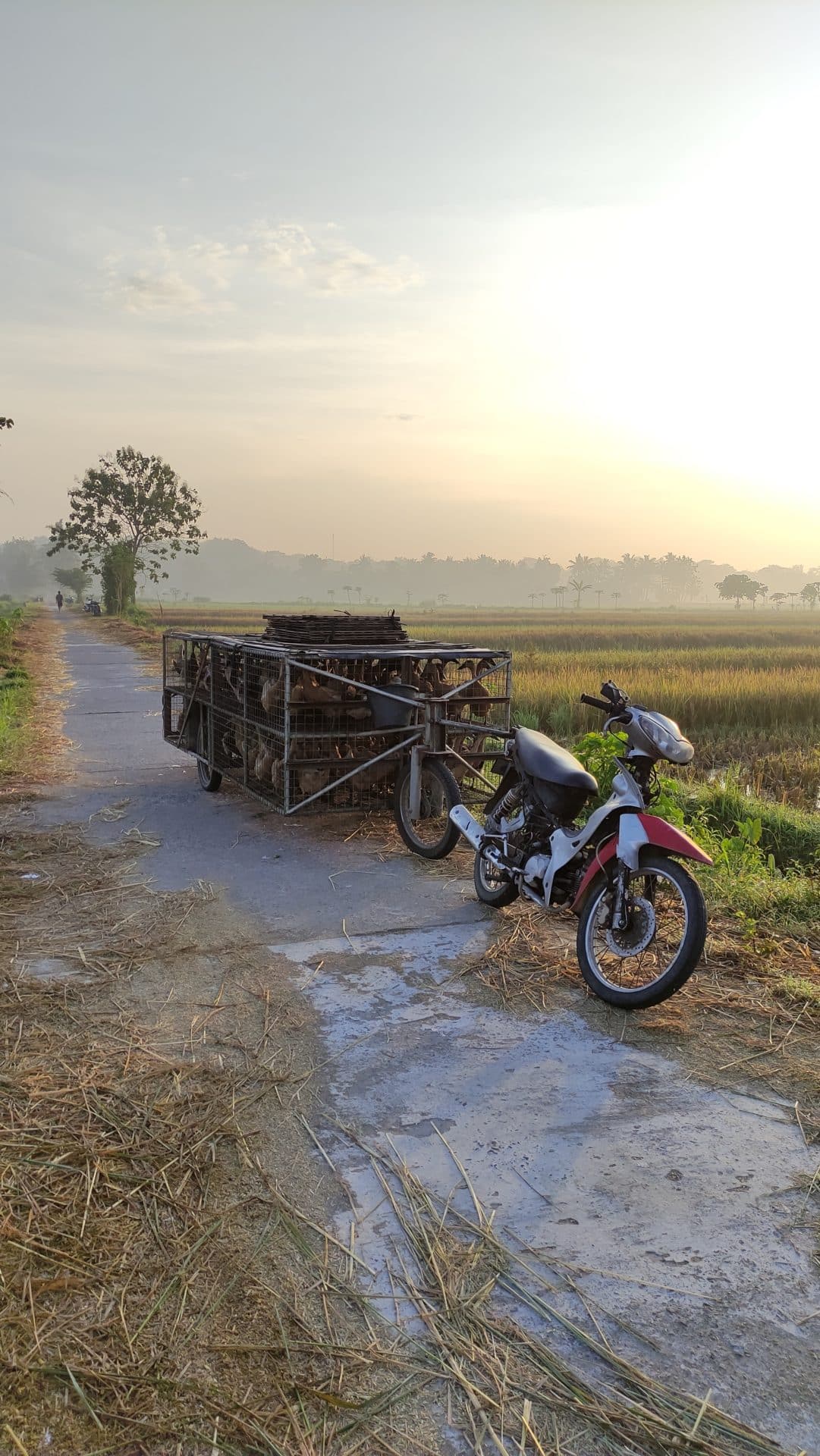
But for the inhabitants of this village, most of whom work in the informal sector, they can only rely on what they currently have. For those who own livestock, they usually sell them at this time of year. And for those who have plots of land, trees are their ‘investment’ – to be used for exactly these sorts of needs. What if their grandchildren are coming to visit from elsewhere, I thought – that moment, a family gathering after two years of pandemic, will require no small amount of money.
I took a deep breath. The chainsaw was still loud. Causing the trunks of those teak trees to crash down to the ground, one by one.
© Cyntara
English translation © Sarah Leys




